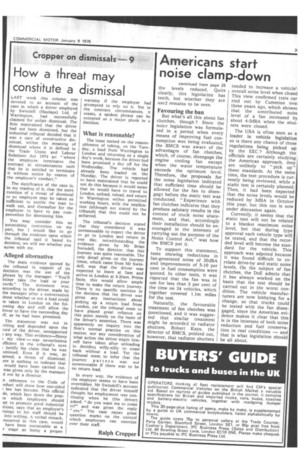How a threat may constitute a dismissal
Page 37

If you've noticed an error in this article please click here to report it so we can fix it.
LAST week this column was devoted to an account of the case in which a driver employed by Swindell (Haulage) Ltd, of Warrington, had successfully claimed for unfair dismissal. The firm maintained that the driver had not been dismissed, but the industrial tribunal decided that it was a case of constructive dismissal, within the meaning of dismissal where it is defined in the Trade Union and Labour Relations Act 1974 as: "where the employee terminates the contract in circumstances such that he is entitled to terminate it without notice by reason of the employer's conduct."
The significance of the case is, in my reading of it, .that the mere mention of a threat of dismissal to an employee may be taken as sufficient to entitle the man to walk out, and thereafter for the employer to have to pay compensation for dismissing him.
You may consider this an astonishing contention on my part, but I would like to go through the evidence upon which the tribunal said it based its decision; we will see whether you agree with me.
Alleged alternative
The main evidence quoted by the tribunal in support of its decision was the use of the phrase by the manager: "You'll 'either take the load or your cards." The statement was, according to the driver, made by the manager after a conversation about whether or not a load could )e taken to London on the folowing day and still allow the Myer to have the succeeding day ■ ft, as he had been promised.
The statement was not in rriting and depended upon the aard of the driver, unsupported a any way. This evidence—flimsy my view was nevertheless ifficient in the tribunal's eyes justify his claim that he was smissed. Even if it was, as aimed, a threat of dismissal, ere is nothing to indicate that would have been carried out. was given only by the manager d not by a director.
A reference to the Code of nduct will show how one-sided law has become. This official de, which lays down the prac?.s which employers should )pt to promote good industrial ations, says that an employer's rnings to his staff should be into writing. A verbal remark, occurred in this case, would have been sustainable at a r stage as being a proper warning if the employer had attempted to rely on it. Yet in the contrary circumstances, it seems, a spoken phrase can be accepted as a major plank in a decision.
What is reasonable?
The issue turned on the reasonableness of taking, on the Tuesday, a load from Warrington to London and returning as a single day's work, because the driver had been promised a day off for the Wednesday. The vehicle had already been loaded on the Monday. The driver is reported to have maintained that he could not do this because it would mean that he would have to travel to London, unload, reload, and return to Warrington within permitted working hours, with the implication (although not stated by the tribunal) that this could not be achieved.
The tribunal's decision stated that they considered it was unreasonable to expect the driver to go to London and return in one day, notwithstanding the evidence given by Mr Brian Swindell, the director, that this journey was quite reasonable. The only detail given on the journey times, which came from Mr Swindell, was that the driver was expected to leave at 5am and arrive in London at 8.30am. Prima facie, this would allow ample time to make the return journey. There is no specific mention in the decision that the driver was given any instructions about picking up a return load from London, yet the tribunal seem to have placed great reliance on this point merely on the basis of the driver's assertion. There was apparently no inquiry into the firm's normal practice on this matter, nor any consideration of what action the driver might himself have taken after unloading in deciding willy-nilly to come back without a load. Yet the tribunal seem, to infer that the journey pat t ern was not unreasonable if there was to be no return load.
In every way, the evidence of the employer seems to have been overridden. Mr Swindell's account indicated that the driver himself thought his employment was continuing when he (the driver) asked: "do you want me to come in?" and was given the reply "yes." The case raises great question marks on the control which employers can exercise over their staff.




















































































